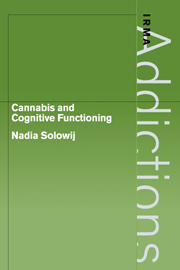1 - Statement of the problem
Published online by Cambridge University Press: 16 September 2009
Summary
What hashish gives with one hand it takes away with the other: that is to say, it gives power of imagination and takes away the ability to profit by it.
Charles Baudelaire (1860) Les Paradis Artificiel, Paris: Poulet-Malassis.Rarely are the consequences of cannabis use described so eloquently by its users as in this extract from Baudelaire writing in the mid-nineteenth century. After euphoria, the acute cognitive effects of cannabis are among those that are most often sought by those who use the drug. The loosening of associations, the intensification of ordinary experiences, a heightening of humour, pleasant imaginative reverie, are all cognitive effects that provide users with a welcome relief from the tedium of everyday life. Some cannabis users experience these effects daily over a period of many years. It has long been suspected that the price paid for the regular elicitation of these diverting cognitive effects of cannabis may be some type of enduring, and possibly irreversible, cognitive impairment, and thus the loss of ability to profit by its use.
There is a prima facie case to support this suspicion. Some long-term cannabis users who seek help to stop their use complain about various worrying cognitive phenomena. They often report: “I forget what I'm saying in the middle of a sentence”, or “I forget why I went from one part of the house to the other” or “I start doing one thing and get distracted into doing something else”. Such statements are made by chronic users who perceive there to be a problem but find it difficult to articulate the precise nature of the problem.
- Type
- Chapter
- Information
- Cannabis and Cognitive Functioning , pp. 1 - 10Publisher: Cambridge University PressPrint publication year: 1998

